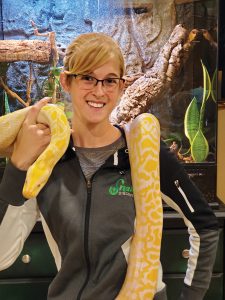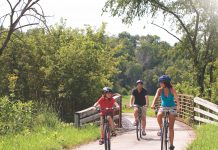Like many of us, Emily Roberts saw some big plans for 2020 slither away. She has nearly 100 animals—mostly snakes, but also lizards, turtles, and Rex, an American alligator. These creatures are part of Roberts’ Maplewood-based Snake Discovery, which provides educational reptile programs for audiences of all ages.
Roberts launched Snake Discovery from her home in the summer of 2015. To build up business, she began advertising and set up a YouTube channel. It quickly grew demand for in-person demonstrations featuring a 7-foot-long boa constrictor named Doug. There’s also a spiny softshell turtle named Taco, along with other fascinating animals Roberts would bring out to scout meetings, birthdays, schools, and libraries. When the coronavirus struck, she had to cancel all educational programs, totaling over 150 events scheduled throughout the summer of 2020.
But Snake Discovery’s YouTube viewership has spiked—apparently due to quarantine, with Roberts viewing her channel as a home-school resource. To date, the channel has surpassed 2 million subscribers, and its videos have netted almost 400 million views. Her most popular, “Incubating Bullsnake Eggs-My Worst Experience Ever,” has been viewed 26 million times since she posted it in 2018.

Provider
Roberts’ love of animals led her to the University of Minnesota, where she earned a degree in fisheries, wildlife, and conservation biology in 2012. While at school, she was an avian nursery intern at the Wildlife Rehabilitation Center of Minnesota, and later became an interpretive naturalist for the Minnesota Department of Natural Resources. This role sparked her love of wildlife education and prompted her and husband Ed to open Snake Discovery.
One of Roberts’ favorite early memories is watching her first clutch of bullsnakes hatch. “It was exhilarating,” she says. “Knowing that we ‘produced’ life still blows my mind.” But the early days had their challenges. Her very first snake died prematurely. “We hadn’t done as much research as we should have,” she says. “We didn’t purchase a thermostat to regulate her heating element’s temperature. It overheated and, sadly, killed her. We realized there is always more to learn, even if you think you’ve got it all.”
With Ed behind the camera, Roberts’ YouTube channel showcases her and her animals’ daily lives, and videos run the gamut, from “Playing Tic Tac Toe with our Exotic Pets!” (featuring fish, snakes, and a parrot) and “How to Turn your Reptile’s Shed Skin into Jewelry!” to “When and How to Euthanize a Snake” and general animal care.
Rex is one of the channel’s stars. Before the Robertses took her in, Rex was kept as a pet. Unfortunately, her previous owners housed her in a small box, which stunted her growth and caused several health conditions. Another oft-featured animal is Nearly Headless Nick, who also came to Roberts under unfortunate circumstances. The garter snake had a run-in with a lawnmower that required facial surgery. Nick lost both eyes but lived an otherwise healthy life for two more years in captivity—much longer than he would have in the wild.
Rex currently lives in a renovated bedroom in Roberts’ home but will soon enjoy her own spacious and specifically designed exhibit. The YouTube success has meant Snake Discovery has built a facility near Maplewood Nature Center, featuring live animal displays, a breeding center, and educational party experiences. (For now, all hands-on programs are on hold due to COVID-19.)
In the meantime, Roberts is working on a series of educational, reptile-related coloring books, and tending to recently hatched snakes. “My husband and I never would have imagined we’d be able to pursue our dream jobs like this,” she says.
Find Snake Discovery on Facebook, Instagram, Twitter, YouTube and at snakediscovery.com
Interested in Reptiles?
For people looking to follow in her footsteps, Roberts has wisdom to share: “Working in the animal field is a very competitive game. To snatch a position that pays a livable wage as an adult, experience is a must! Start networking as soon as possible by volunteering at businesses or organizations that relate to your passion. Many zoos, nature centers, etc., require a biology or animal science (of sorts) degree as well as previous experience. Starting your own business that relates to animals is even more difficult, but still possible! You need to be very driven and plan on spending at least a couple of years building your reputation. If you plan on starting your own business, I recommend not quitting your day job until it has taken off well enough to make a livable wage.”
For those interested in reptiles: “I highly recommend joining the Minnesota Herpetological Society. This reptile club meets once monthly in St. Paul and is a wonderful source of information for all levels of experience. Meetings are free to attend, and rescued reptiles are available for adoption!”






